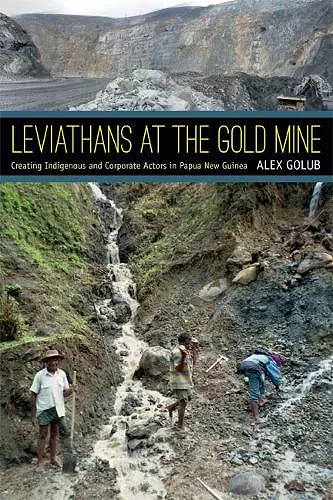Leviathans at the Gold Mine
Creating Indigenous and Corporate Actors in Papua New Guinea
Format:Paperback
Publisher:Duke University Press
Published:10th Mar '14
Currently unavailable, and unfortunately no date known when it will be back

Leviathans at the Gold Mine is an ethnographic account of the relationship between the Ipili, an indigenous group in Papua New Guinea, and the large international gold mine operating on their land. It was not until 1939 that Australian territorial patrols reached the Ipili. By 1990, the third largest gold mine on the planet was operating in their valley. Alex Golub examines how "the mine" and "the Ipili" were brought into being in relation to one another, and how certain individuals were authorized to speak for the mine and others to speak for the Ipili. Considering the relative success of the Ipili in their negotiations with a multinational corporation, Golub argues that a unique conjuncture of personal relationships and political circumstances created a propitious moment during which the dynamic and fluid nature of Ipili culture could be used to full advantage. As that moment faded away, social problems in the valley increased. The Ipili now struggle with the extreme social dislocation brought about by the massive influx of migrants and money into their valley.
"Golub's study of gold mining in Papua New Guinea is not only a fascinating ethnography but a strong tonic for anthropology, for law and courts, and for governments and corporations insofar as they continue to subscribe to the notion of fixed indigenous 'societies' and 'cultures'--or truly of any social facts or institutions that they dream have been or can be settled once and for all through the (post)modern techniques of audit and governmentality." -- Jack David Eller * Anthropology Review Database *
"Golub’s chapter on the Ipili is an ethnographic tour de force." -- Martha MacIntyre * Current Anthropology *
“Leviathans at the Gold Mine truly does justice to Porgera’s complex reality. The author’s theoretically ambitious approach provides a sophisticated and refreshing perspective on the constantly evolving relationship between mining companies and local communities. It is accessible to multiple audiences and is a go-to book for anyone interested in mining, governmentality, Melanesian anthropology or globalisation. With a variety of writing genres displayed in each chapter – all written in Golub’s clear, witty and at times poetic style – Leviathans is a pleasure to read.” -- Shaun Gessler * Journal of Pacific History *
"Golub benefits from and contributes to a long conversation with fellow anthropologists who have been working in the area for several decades (Biersack, Burton, Filer, Jorgensen, and others) and who constitute another kind of grouping with blurred boundaries, variable ties, and internal controversies, which ultimately appears to be as feasible as the Ipili." -- Pierre-Yves Le Meur * American Anthropologist *
"Ethnographies from the Highlands of Papua New Guinea (PNG) have appeared frequently enough in the past half-century to make it rare to encounter a truly innovative one. Yet this is just such a work. Golub is a thoughtful and well-read scholar, and his book sparkles with anthropological insights throughout." -- Richard Scaglion * Journal of Anthropological Research *
"[C]ombining history, anthropology, and Melanesian cultural studies, [the book] keeps to its word on going beyond simplistic generalizations to reach a more nuanced understanding of the actors in play." -- Tess Lea * Bulletin of the Pacific Circle *
"Golub succeeds in presenting complex ideas and arguments in a readable and at times entertaining fashion. Scholars interested in kinship, cosmology and vernacular ideas of personhood and social relations should find the volume to be highly relevant to understanding emergent ideas about kinship." -- Simon Kenema * The Asia Pacific Journal of Anthropology *
ISBN: 9780822355083
Dimensions: unknown
Weight: 363g
264 pages